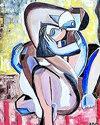SOCIAL PROPERTY IN THE COCHABAMBA WATER WAR, BOLIVIA 2000
IF 0.3
4区 社会学
0 HUMANITIES, MULTIDISCIPLINARY
ANGELAKI-JOURNAL OF THE THEORETICAL HUMANITIES
Pub Date : 2023-01-02
DOI:10.1080/0969725X.2023.2167785
引用次数: 0
Abstract
Abstract The Cochabamba water war in 2000 was the first water war of the twenty-first century. During the mobilizations in Bolivia, a factory workers’ manifesto read: “We don’t want private property nor state property, but self-management and social property.” The social practices of many Cochabambinos and Cochabambinas did not defend water as an object. They supported forms of life in common and a way of practicing democracy in the politics of presence. They recalled traditional usos y costumbres, which have been reconfigured in their encounter with other unprecedented practices, situations, and legal systems. Finally, the water war insurgents aimed to restore another practice of democracy and different property relations. Social property (propiedad social) was born in the social and political context of the water war mobilizations. In this article, I investigate social property as a practice that exceeds the current legal definition of ownership and discloses new legal forms of relationship with water. Methodologically, it is about extracting theory from practice – extracting from concrete social practices new concepts that require thinking about.2000年玻利维亚科恰班巴水战争中的社会财产
摘要2000年的科恰班巴水资源战争是21世纪的第一次水资源战争。在玻利维亚的动员期间,一份工厂工人的宣言写道:“我们不想要私人财产或国家财产,而是自我管理和社会财产。他们支持共同的生活方式和在存在政治中实践民主的方式。他们回顾了传统的usos和cosumbres,在遇到其他前所未有的做法、情况和法律制度时,它们已经被重新配置。最后,水上战争叛乱分子旨在恢复另一种民主实践和不同的财产关系。社会财产(propiedad Social)是在水战争动员的社会和政治背景下产生的。在这篇文章中,我调查了社会财产作为一种实践,它超越了当前法律对所有权的定义,并揭示了与水关系的新的法律形式。从方法论上讲,它是从实践中提取理论——从具体的社会实践中提取需要思考的新概念。
本文章由计算机程序翻译,如有差异,请以英文原文为准。
求助全文
约1分钟内获得全文
求助全文
来源期刊

ANGELAKI-JOURNAL OF THE THEORETICAL HUMANITIES
HUMANITIES, MULTIDISCIPLINARY-
CiteScore
0.60
自引率
33.30%
发文量
57
期刊介绍:
Angelaki: journal of the theoretical humanities was established in September 1993 to provide an international forum for vanguard work in the theoretical humanities. In itself a contentious category, "theoretical humanities" represents the productive nexus of work in the disciplinary fields of literary criticism and theory, philosophy, and cultural studies. The journal is dedicated to the refreshing of intellectual coordinates, and to the challenging and vivifying process of re-thinking. Angelaki: journal of the theoretical humanities encourages a critical engagement with theory in terms of disciplinary development and intellectual and political usefulness, the inquiry into and articulation of culture.
 求助内容:
求助内容: 应助结果提醒方式:
应助结果提醒方式:


